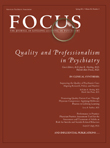Case Studies in Ethics
VIGNETTE 1
A junior faculty member in an academic department of psychiatry and behavioral medicine is told by a resident supervisee that a senior member of the faculty has been behaving erratically. The resident says that she suspects that the senior clinician has been abusing alcohol and that she believes his clinical judgment has been adversely affected. The faculty member has had little contact with his senior colleague, but he has no reason to question the resident's judgment. He encourages the resident to speak to her training director about her concerns. She refuses, saying that she fears retribution.
Which of the following is the junior faculty member's next best course of action?
| A. | Discuss the matter with the senior colleague and then report it to the department chairman. | ||||
| B. | Do nothing for now, but plan to take action if another resident complains. | ||||
| C. | Encourage the resident to be more assertive in her professional interactions. | ||||
| D. | Inform the training director that the residents are having problems with the senior colleague. | ||||
| E. | Leave an anonymous note in the senior colleague's mailbox informing him that his abuse of alcohol has become a matter of public discussion and urging him to seek appropriate help. | ||||
VIGNETTE 2
A psychiatrist has been treating a female patient for depression. During the course of psychotherapy, the patient reveals that she had sexual relations with a previous therapist.
Which of the following is the therapist's most appropriate immediate response to this revelation?
| A. | Allow the patient to continue to tell her story without pressuring her to act. | ||||
| B. | Encourage the patient to report the incident to a professional ethics committee. | ||||
| C. | Encourage the patient to report the incident to the state licensing board. | ||||
| D. | Offer to contact the previous therapist and confront him on the patient's behalf. | ||||
| E. | Question the patient gently but firmly to establish the identify of the previous therapist. | ||||
As a member of a profession charged with self-regulation, the psychiatrist has a duty to help identify colleagues who behave unethically. However, in this case, that duty does not outweigh the responsibility to be clinically helpful to this patient. At some point, it may be therapeutic for this patient to take action, such as reporting her previous therapist to the state licensing board or professional ethics committee. However, the psychiatrist should not push the patient to do anything before the patient is prepared to do so. In addition, taking matters into the psychiatrist own hands may also have detrimental effects on the patient. When and if the patient is ready to proceed, options for reporting should be explained. Some states have criminalized therapists' sexual relationships with patients and have codified the response subsequent treating therapists should follow (3, 4).
Answer for Vignette 1: A
Answer for Vignette 2: A
1 American Psychiatric Association: Ethics Primer of the American Psychiatric Association. Washington, DC, American Psychiatric Association 2001Google Scholar
2 Group for the Advancement of Psychiatry: A Casebook in Psychiatric Ethics. New York, Brunner/Mazel, 1990Google Scholar
3 Bloom JD, Nadelson CC, Notman MT (eds): Physician Sexual Misconduct. Washington, DC, American Psychiatric Press, 1999Google Scholar
4 Stone AA: Sexual misconduct by psychiatrists: the ethical and clinical dilemma of confidentiality. Am J Psychiatry 1983; 140:195–197Crossref, Google Scholar



